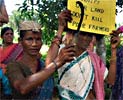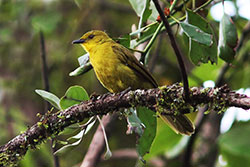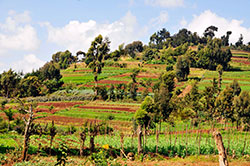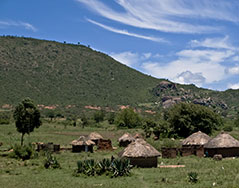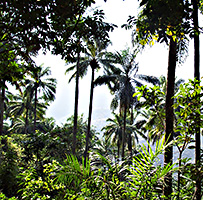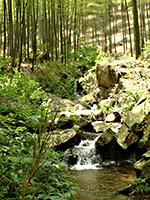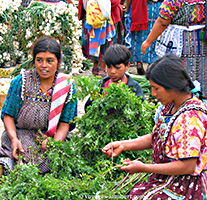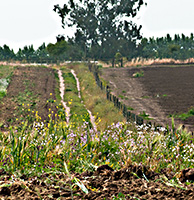A village in Kenya – about 1930
Discord in the village
Njahi, the rain season, is the most pleasant time of the year. When the rain has fallen, everyone is sure that there will be a good harvest, and is in a good mood. Overnight the fields become green, as if a goddess has waved over it with a magic wand. Everywhere you see flowers, everywhere you hear birds. The children run happily after each other, or climb in the trees.
Njeri, a sturdy, dark woman, is busy with her hoe, while singing and joking with the other women. When she hears a baby crying, she looks up and calls to the older children that they have to take care of the young ones.
A while later, when the women are eating in the shade, one of them says that she has heard that the white people want to build an administrative post somewhere in their region. That they will have to pay taxes, and that possibly controlling white farmers will come who will take away their land. It alarms Njeri, but a moment later she remembers that she has heard this sort of rumour more often the last years. She has a sunny nature, and as soon as everyone is working, she sings along with the others, and makes one joke after another.
In the evening, when Njeri is walking home and has turned off to the long path to her hut on top of the hill, she nevertheless starts to worry. There is discord in the village. There are the villagers around her brother-in-law Joshua, who have converted to Christianity. There is the group of Kabonyi, which want to adhere strictly to the old traditions, and the people who idolize Waiyaki, the modern schoolteacher.
“Although Joshua is my brother-in-law,” she thinks, “and he can preach wonderfully about Jesus who loves all people, why are our own gods Murungu, Mwenenyaga and Ngai not good enough? And the men of Kabonyi with their Kiama, their secret society, who want to keep the tribe unspoiled, as they say. Why do they have to threaten Christians? After all, they are still our sisters and brothers.”
“At least Waiyaki is there,” Njeri thinks, “our young teacher. I love him most of all. He learned a lot from the white people, the missionaries in the city. But he has come back, and has opened a school, so that our children can learn what the white people know and do. But, he remains true to his people. He hasn't become an errand-boy of the whites.”
In this way, Njeri is reasoning to herself. Then, she sees a few boys walking up with the goats and cows of their families. They are heading home, they urge the animals along, meanwhile having fun by running after each other, with their herder sticks raised, 'threatening'. Njeri laughs, and forgets – temporarily – her worries about the discord in the village.
_______________________
Source
The short novel The river between (1965) from the Kenyan author Ngũgĩ wa Thiong'o describes the tensions in a remote area, when the whites are pushing closer.
Go to:
= the next page: The mother - a hamlet in the Zhejiang Province, China – about 1930, story 82.
= the Table of contents, story 81.
